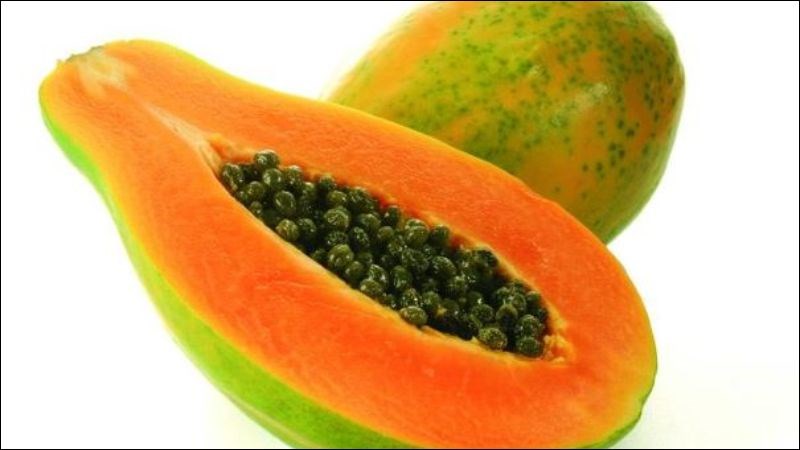Ripe papaya is not only a delicious and nutritious food but can also be used as a medicine to treat many diseases. However, for some people, eating too much ripe papaya will make their illness worse.
Papaya can be considered a “miracle drug”, because many parts of the papaya tree are not only used as food but also used as medicine to treat many diseases.
In 100g of ripe papaya, there are 74-80 mg of vitamin C and 500-1,250 IU of carotene. Papaya also contains vitamins B1, B2, enzymes and minerals such as potassium, calcium, magnesium, iron and zinc.
Eating papaya regularly has the effect of enriching the blood, helping to restore the liver in people with malaria, anti-oxidation, increasing the body’s resistance… However, it is impossible to predict the side effects of ripe papaya in the following cases:
People with jaundice
Not only ripe papaya, pumpkin, carrots, mangoes… are all foods that contain a lot of beta carotene. Many people eat a lot of these foods, leading to yellowing of the palms, soles, backs of the hands, and backs of the feet due to the accumulation of beta carotene.
To improve this symptom, you should stop eating for a while. If the condition does not improve, you should see a specialist to find the cause.

Ripe papaya has many medicinal uses but not everyone can eat it.
People with stomach problems
Eating ripe papaya regularly will stimulate the digestive system, reducing symptoms of indigestion and constipation.
However, eating too much papaya will upset your digestive system, which can cause stomach disorders with symptoms such as abdominal pain, nausea, bloating, abdominal distension, etc.
The main culprit of these symptoms is the abundance of fiber and papaya latex in the stomach, causing the stomach to contract a lot. It even stimulates the stomach to cause vomiting.
People with allergies
If you have a respiratory disorder such as asthma, or any allergies, be careful when eating papaya. Sometimes pollen can stick to the papaya skin, so make sure you wear gloves when peeling papaya.
Throw the skin and gloves in the trash immediately after peeling. You should also cover your mouth and nose with a towel to avoid allergies.
Papaya allergy often has the following symptoms: swelling of the mouth, itching around the face and throat, rash on the tongue, dizziness, headache, abdominal pain, difficulty breathing and swallowing.
People with poor digestion
Papaya is considered an effective natural remedy for constipation, but if overused, the result will be completely opposite. Because when the fiber content is high, the amount of water also increases, the stool will become hard, causing constipation.
People with diarrhea should not eat too much because of the high fiber content. If you eat too much during this time, the body can easily fall into a state of severe dehydration.
Patients with blood thinners
People with blood thinners should avoid eating papaya because papaya leaves have the ability to thin the blood.
Therefore, if you are taking any medication to treat blood thinners or anticoagulants such as aspirin, for example, or you have just had surgery a few weeks ago, stay away from this fruit due to its anticoagulant properties.
Note: Papaya seeds are very good for medicine, but when eating, you should pay attention to remove all the seeds, because papaya seeds contain a toxic substance called carpine.
A large amount of carpine will cause you to have a heart attack and weaken the nervous system.
Distinguishing between tree-ripened papaya and chemically treated papaya
For profit, gardeners often inject chemicals to make papaya both beautiful and valuable, so when buying, you need to distinguish between tree-ripened papaya and chemically treated papaya:
– Naturally ripened papaya always has one side that is riper than the other because the outer side receives more sunlight.
The skin usually has a layer of white fungus on top, sometimes with black dots or small dents, the color is not evenly yellow but still has green dots.
In terms of appearance, naturally ripened papaya feels soft and smooth to the touch, the yellow spots no longer show the presence of resin.
– Papayas that have been treated with chemicals have shiny skin and feel hard to the touch even though the outer skin has turned bright yellow. When you see a fruit that is evenly ripe from the stem, it has definitely been treated with chemicals.





